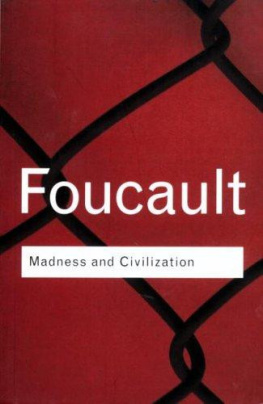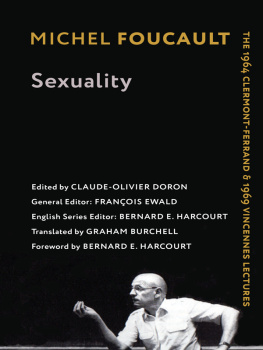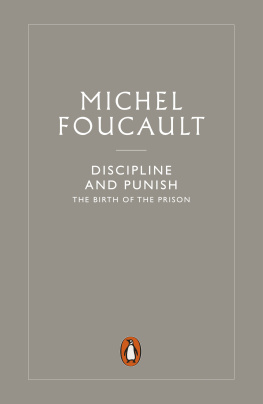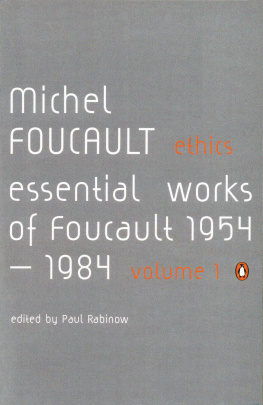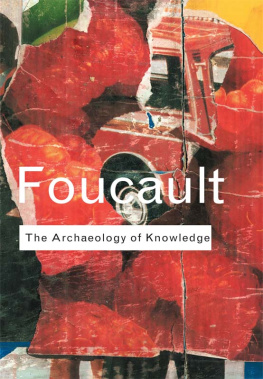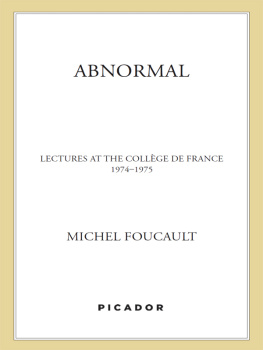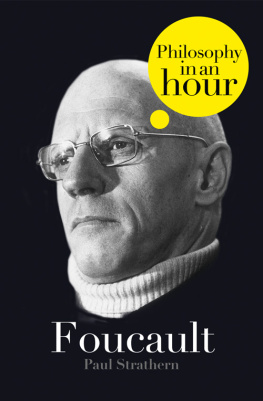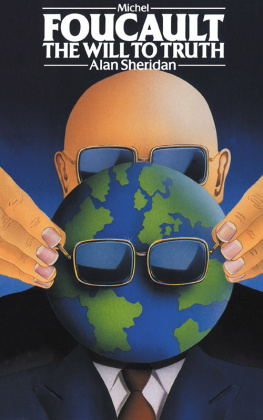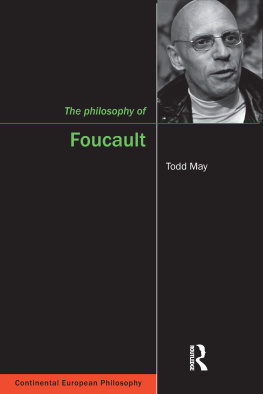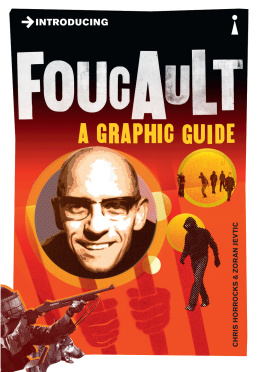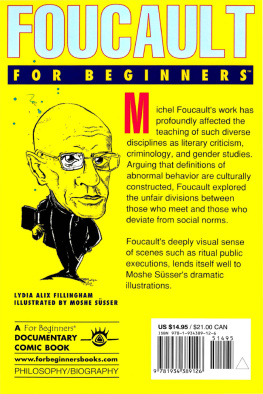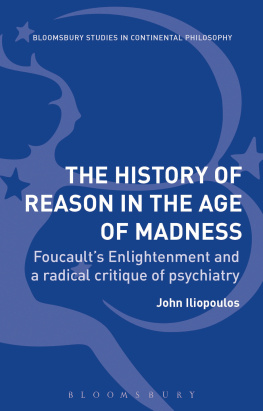Michel Foucault - Madness and Civilization (Routledge Classics)
Here you can read online Michel Foucault - Madness and Civilization (Routledge Classics) full text of the book (entire story) in english for free. Download pdf and epub, get meaning, cover and reviews about this ebook. year: 2001, publisher: Routledge, genre: Science. Description of the work, (preface) as well as reviews are available. Best literature library LitArk.com created for fans of good reading and offers a wide selection of genres:
Romance novel
Science fiction
Adventure
Detective
Science
History
Home and family
Prose
Art
Politics
Computer
Non-fiction
Religion
Business
Children
Humor
Choose a favorite category and find really read worthwhile books. Enjoy immersion in the world of imagination, feel the emotions of the characters or learn something new for yourself, make an fascinating discovery.
- Book:Madness and Civilization (Routledge Classics)
- Author:
- Publisher:Routledge
- Genre:
- Year:2001
- Rating:4 / 5
- Favourites:Add to favourites
- Your mark:
- 80
- 1
- 2
- 3
- 4
- 5
Madness and Civilization (Routledge Classics): summary, description and annotation
We offer to read an annotation, description, summary or preface (depends on what the author of the book "Madness and Civilization (Routledge Classics)" wrote himself). If you haven't found the necessary information about the book — write in the comments, we will try to find it.
Madness and Civilization (Routledge Classics) — read online for free the complete book (whole text) full work
Below is the text of the book, divided by pages. System saving the place of the last page read, allows you to conveniently read the book "Madness and Civilization (Routledge Classics)" online for free, without having to search again every time where you left off. Put a bookmark, and you can go to the page where you finished reading at any time.
Font size:
Interval:
Bookmark:
Michel Foucault
Madness and Civilization
A History of Insanity in the Age of Reason
michel foucault has achieved something truly creative in this book on the history of madness during the so-called classical age: the end of the sixteenth and the seventeenth and eighteenth centuries. Rather than to review histori-cally the concept of madness, the author has chosen to re-create, mostly from original documents, mental illness, folly, and unreason as they must have existed in their time, place, and proper social perspective. In a sense, he has tried to re-create the negative part of the concept, that which has disappeared under the retroactive influence of present-day ideas and the passage of time. Too many historical books about psychic disorders look at the past in the light of the present; they single out only what has positive and direct relevance to present-day psychiatry. This book be-longs to the few which demonstrate how skillful, sensitive scholarship uses history to enrich, deepen, and reveal new avenues for thought and investigation.
No oversimplifications, no black-and-white statements, no sweeping generalizations are ever allowed in this book; folly is brought back to life as a complex social phenome-non, part and parcel of the human condition. Most of the time, for the sake of clarity, we examine madness through one of its facets; as M. Foucault animates one facet of the problem after the other, he always keeps them related to each other. The end of the Middle Ages emphasized the comic, but just as often the tragic aspect of madness, as in Tristan and Iseult, for example. The Renaissance, with (v)
Erasmus's Praise of Folly, demonstrated how fascinating imagination and some of its vagaries were to the thinkers of that day. The French Revolution, Pinel, and Tuke empha-sized political, legal, medical, or religious aspects of mad-ness; and today, our so-called objective medical approach, in spite of the benefits that it has brought to the mentally ill, continues to look at only one side of the picture. Folly is so human that it has common roots with poetry and trag-edy; it is revealed as much in the insane asylum as in the writings of a Cervantes or a Shakespeare, or in the deep psychological insights and cries of revolt of a Nietzsche. Correctly or incorrectly, the author feels that Freud's death instinct also stems from the tragic elements which led men of all epochs to worship, laugh at, and dread folly simultaneously. Fascinating as Renaissance men found it- they painted it, praised it, sang about it-it also heralded for them death of the body by picturing death of the mind.
Nothing is more illuminating than to follow with M. Foucault the many threads which are woven in this com-plex book, whether it speaks of changing symptoms, com-mitment procedures, or treatment. For example: he sees a definite connection between some of the attitudes toward madness and the disappearance, between 1200 and 1400, of leprosy. In the middle of the twelfth century, France had more than 2,000 leprosariums, and England and Scot-land 220 for a population of a million and a half people. As leprosy vanished, in part because of segregation, a void was created and the moral values attached to the leper had to find another scapegoat. Mental illness and un-reason attracted that stigma to themselves, but even this was neither complete, simple, nor immediate.
Renaissance men developed a delightful, yet horrible way of dealing with their mad denizens: they were put on a ship and entrusted to mariners because folly, water, and sea, as everyone then "knew," had an affinity for each (vi)
other. Thus, "Ships of Fools" crisscrossed the seas and canals of Europe with their comic and pathetic cargo of souls. Some of them found pleasure and even a cure in the changing surroundings, in the isolation of being cast off, while others withdrew further, became worse, or died alone and away from their families. The cities and villages which had thus rid themselves of their crazed and crazy, could now take pleasure in watching the exciting sideshow when a ship full of foreign lunatics would dock at their harbors.
The seventeenth and eighteenth centuries saw much social unrest and economic depression, which they tried to solve by imprisoning the indigents with the crimi-nals and forcing them to work. The demented fitted quite naturally between those two extremes of social maladjust-ment and iniquity.
A nice and hallowed tradition has labeled Tuke and Pinel as the saviors of the mentally ill, but the truth of the matter is not so simple. Many others had treated them with kind-ness, pleading that they belonged first and foremost with their families, and for at least two hundred years before the i78os, legislation had been considered or passed to segregate criminals and indigents from fools. But this legis-lation was prompted, as often as not, by a desire to protect the poor, the criminal, the man imprisoned for debts, and the juvenile delinquent from the frightening bestiality of the madman. As the madman had replaced the leper, the mentally ill person was now a subhuman and beastly scape-goat; hence the need to protect others. While the Quaker Tuke applied his religious principles, first to demented "friends" and later to foes also, partly to convert them, the great Pinel was not sure at times that he was dealing with sick people; he often marveled at their unbelievable endur-ance of physical hardship, and often cited the ability of schizophrenic women to sleep naked in subfreezing tem-peratures without suffering any ill effects. Were not these
(vii)
people more healthy, more resistant than ordinary human beings? Didn't they have too much animal spirit in them?
Naturally, it is impossible to discuss a book as complex as Madness and Civilization without oversimplifying and do-ing it an injustice. It is a tale of nuances, relative values, and delicate shadings. Yet, it is an impressive monument: in a dispassionate manner it marshals overwhelming evidence to dispel more effectively than many previous attempts the myth of mental illness, and re-establishes folly and un-reason in their rightful place as complex, human-too hu-man-phenomena. The roots and symptoms of folly are being looked for today in psychology, medicine, and soci-ology, but they were and still are as present and important in art,* religion, ethics, and epistemology. Madness is really a manifestation of the "soul," a variable concept which from antiquity to the twentieth century covered approxi-mately what came to be known, after Freud, as the un-conscious part of the human mind. + Only time will tell how much better students of the psyche can look at the future, after reading this sobering re-creation of yesteryear's mad-ness and the ineffective attempts of humanity to treat it by amputation, projections, prejudices, and segregation.
jose barchilon, M.D.
* My only quarrel with the book is the lack of emphasis on the humoristic elements in psychoses and neuroses: i.e., the patient laughs at him-self, or laughs at the world through his illness.
+ The fear and dread of madness is as real a factor in social and medical attitudes or measures as anxiety, symptoms, and resistance in coping with impulses from the individual unconscious; even though the author does not explicitly compare madness with the unconscious, he equates mad-ness and dream activity so that the inference is clear enough.
(viii)
pascal: "Men are so necessarily mad, that not to be mad would amount to another form of madness." And Dostoievsky, in his diary of a writer: "It is not by confining one's neighbor that one is convinced of one's own sanity."
We have yet to write the history of that other form of madness, by which men, in an act of sovereign reason, con-fine their neighbors, and communicate and recognize each other through the merciless language of non-madness; to define the moment of this conspiracy before it was perma-nently established in the realm of truth, before it was re-vived by the lyricism of protest. We must try to return, in history, to that zero point in the course of madness at which madness is an undifferentiated experience, a not yet divided experience of division itself. We must describe, from the start of its trajectory, that "other form" which relegates Reason and Madness to one side or the other of its action as things henceforth external, deaf to all exchange, and as though dead to one another.
Next pageFont size:
Interval:
Bookmark:
Similar books «Madness and Civilization (Routledge Classics)»
Look at similar books to Madness and Civilization (Routledge Classics). We have selected literature similar in name and meaning in the hope of providing readers with more options to find new, interesting, not yet read works.
Discussion, reviews of the book Madness and Civilization (Routledge Classics) and just readers' own opinions. Leave your comments, write what you think about the work, its meaning or the main characters. Specify what exactly you liked and what you didn't like, and why you think so.

